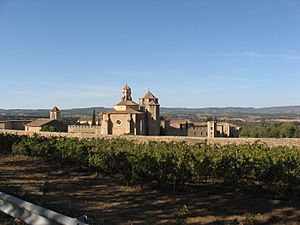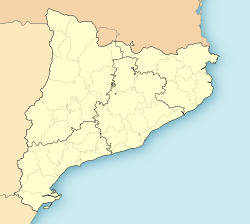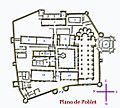Poblet Abbey facts for kids
Quick facts for kids Royal Abbey of Santa Maria de Poblet |
|
|---|---|
|
Reial Monestir de Santa Maria de Poblet
|
|
 |
|
| Religion | |
| Affiliation | Catholic Church |
| Leadership | Abott Octavi Vilà i Mayo |
| Location | |
| Location | Vimbodí i Poblet (Tarragona), Catalonia, Spain |
| Architecture | |
| Architect(s) | Arnau Bargués |
| Architectural type | Monastery |
| Architectural style | Catalan Gothic |
| UNESCO World Heritage Site | |
| Criteria | Cultural: (i), (iv) |
| Inscription | 1991 (15th Session) |
| Type | Non-movable |
| Criteria | Monument |
| Designated | 13 July 1921 |
| Reference no. | RI-51-0000197 |
Poblet Abbey, also known as the Royal Abbey of Santa Maria de Poblet, is a very old Cistercian monastery in Catalonia, Spain. It was started by Cistercian monks from France in 1151. It sits at the foot of the Prades Mountains. The main architect who designed parts of it was Arnau Bargués.
This monastery was one of three important monasteries in Catalonia. They were called the "Cistercian triangle" and helped make the region strong in the 12th century. The other two monasteries are Vallbona de les Monges and Santes Creus.
Contents
Why Poblet Abbey Is Important
Poblet was a special burial place for the kings of the Crown of Aragon. It was one of only two royal tombs for these kings. Many important royal tombs here have beautiful alabaster statues lying on top. The statues of kings have lion sculptures at their feet, while queens have dog sculptures.
Peter IV of Aragon (who lived from 1319 to 1387) made a promise that all future Aragonese kings would be buried at Poblet. Only Ferdinand II of Aragon did not follow this promise. He was buried in Granada after his kingdoms joined with the Crown of Castile.
When the monastery was at its busiest, more than 300 monks lived there. They also had many "Cistercian farms" run by lay brothers. These brothers worked the land and forests. The monastery buildings cover about 12,000 square meters.
Kings and Queens Buried at Poblet
Many kings and queens of Aragon are buried at Poblet Monastery. Here are some of them:
- Alfonso II (died 1196)
- James I (died 1276)
- Peter IV (died 1387), and his first three wives: Maria of Navarre, Eleanor of Portugal, and Eleanor of Sicily
- John I (died 1396), and his wives: Martha of Armagnac and Violant of Bar
- Martin (died 1410), and his first wife: Maria de Luna
- Ferdinand I (died 1416), and his wife: Eleanor of Alburquerque
- Alfonso V (died 1458)
- John II (died 1479), and his second wife: Joana Enríquez
Other important people buried here include the Hungarian queen Beatrice of Naples (died 1508) and Philip Wharton, 1st Duke of Wharton (died 1731). The royal tombs were fixed up by the Catalan sculptor Frederic Marés in 1948.
How the Monastery Was Ruined and Rebuilt
The monastery was damaged during a war called the First Carlist War. Then, in 1835, it was closed down by the government during Isabella II of Spain's rule. This event, called the Desamortización, meant that monks could no longer live there.
On July 24 of that year, the monastery was robbed by people from the government and angry crowds. All valuable paintings and furniture were taken away. Some parts of the monastery were also burned.
In the years that followed, the monastery fell apart. Some of the main roofs collapsed. The tombs of the rulers were damaged, and their remains were moved to the Cathedral of Tarragona. This was done thanks to Rev. Antoni Serret from the nearby town of L'Espluga.
Finally, in 1940, Italian monks of the same order started the monastery again. They began to repair and rebuild it. Near the church entrance, one building has been left in ruins. It serves as a reminder of the past damage. The remains of the old royal family members were put back into new tombs.
Poblet is part of the Cistercian Congregation of the Crown of Aragon. This group also includes Santa Maria de Solius and other convents. The Abbot of Poblet is the leader of this group. Today, 29 monks live at Poblet.
Poblet Monastery has been a UNESCO World Heritage Site since 1991. This means it is a very important place for everyone in the world. The altar, made in 1527, was carved by Damián Forment. In 2010, Spanish architect Mariano Bayón designed a guesthouse for the monastery.
Leaders of Poblet Abbey
The current abbot is the 105th abbot of Poblet.
- 1954–1966: Edmon Maria Garreta i Olivella
- 1966–1970: Robert Saladrigues
- 1970–1998: Maurus Esteva Alsina
- 1998–2015: Josep Alegre i Vilas
- 2015–current: Octavi Vilà i Mayo
Gallery
-
The main belltower
-
The tomb of Ferdinand I of Aragon and Eleanor of Albuquerque
-
The tomb of James I of Aragon
-
A fountain used for washing in one of the cloisters
-
The Poblet Monastery Guesthouse, designed by Mariano Bayón in 2010
See also
 In Spanish: Monasterio de Poblet para niños
In Spanish: Monasterio de Poblet para niños
- Crown of Aragon
- Organ of Poblet
- Pedro Antonio de Aragón, a supporter of the monastery











